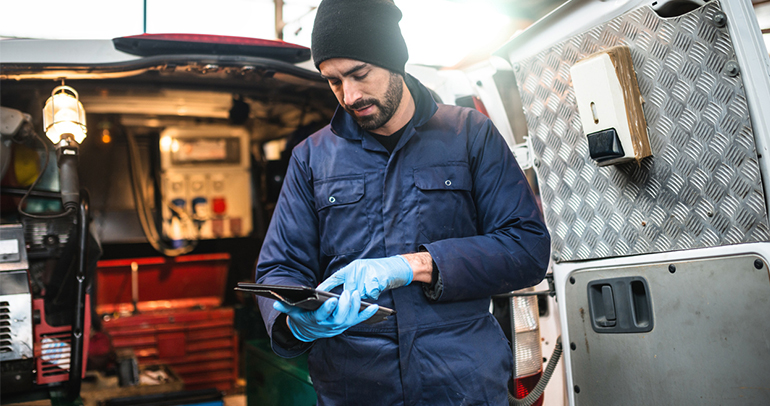
While taking a trip around town these days, you’re more likely to see a battery electric vehicle (BEV) on the road than ever before. Thanks in large part to CAFE regulations driving products to market, the slow, but steady acceptance of BEVs among everyday drivers makes widespread adoption feel more like an inevitability, despite currently limited profitability for automakers.
Often, the role of commercial vehicle and fleet operators are overlooked as a leading indicator in the picture of BEVs’ growth toward mainstream adoption.
Operating a fleet is difficult, with many decision-makers facing extensive fuel and routine maintenance costs, as well as significant competition at every level. Finding a way to alleviate costs associated with operating a vehicle is critical to the success of the business. BEVs, for example, offer much more serviceable platforms and options for turnkey maintenance, which reduces downtime and hard costs while boosting revenue and customer perceptions.
Fleet Advisory Hub, one of Escalent’s latest mobility insight solutions, offers rolling dynamic snapshots of the attitudes of decision-makers managing business vehicles. As part of our ongoing outreach to this critical managerial group, we asked them about the perceptions and realities of incorporating BEV technology into their own fleets. What we learned was a little surprising.
Fleets that rely on traditional gas or diesel vehicles for their livelihood are increasingly considering a turn to BEV technology in the near-term, even though doing so often means making changes to their operations to accommodate new capabilities and needs, alike.
Our latest installment of insights show a majority of fleet businesses proactively shopping for BEVs, with many readying their businesses for the complex and operation-shifting process of integrating such technologies:
- 52% of firms are shopping for BEVs, with over one-third gathering information about the electric vehicles offered and requirements for fleet integration, while nearly one-in-five are analyzing costs.
- 45% of adopters recognize the need to make significant operational changes to their business to accommodate BEV integration, which in turn positively impacts total cost of ownership, vehicle uptime and downtime, service and maintenance, and charging infrastructure. Conversely, the remaining majority (55%) are not aware of either the changes needed for, or positive impacts of, integrating BEVs into their fleets, which underscores the importance of educating and supporting fleets in managing this substantial business change.
- Just 8% of fleet decision-makers have personally experienced BEVs as a driver or passenger.
- Most fleets continue to exhibit some traditional vehicle shopping habits, with 58% of decision-makers still purchasing business vehicles from a dealership.
These numbers are telling. While fleet managers are eagerly shopping for the latest and greatest tools to help them do their jobs, they’re doing so in an extremely traditional way—by going to their local dealer.
To make a lasting impression, automakers must ensure their dealer network is equipped to respond (and more!) to the brewing storm of questions posed by fleet managers exploring BEVs as a viable alternative to gas or diesel vehicles. Demonstrating the capabilities of the vehicles themselves is important, but working through major operational shifts and offering a consultative approach to shepherd buyers through such a transformative process is the sustainable path to success.
Are you looking for ways to win with the fleet decision-makers driving BEV adoption? Send us a note today to learn more about how Fleet Advisory Hub can help you create successful strategies with the latest and greatest insights directly from fleet managers themselves.
The results reported come from our 2020 second quarter report on fleet electrification, comprised of a subset of commercial and fleet vehicle decision-makers drawn from the Fleet Advisory Hub audience. Participants were recruited from an opt-in online panel of business decision-makers and were interviewed online. Escalent will supply the exact wording of any survey question upon request.









